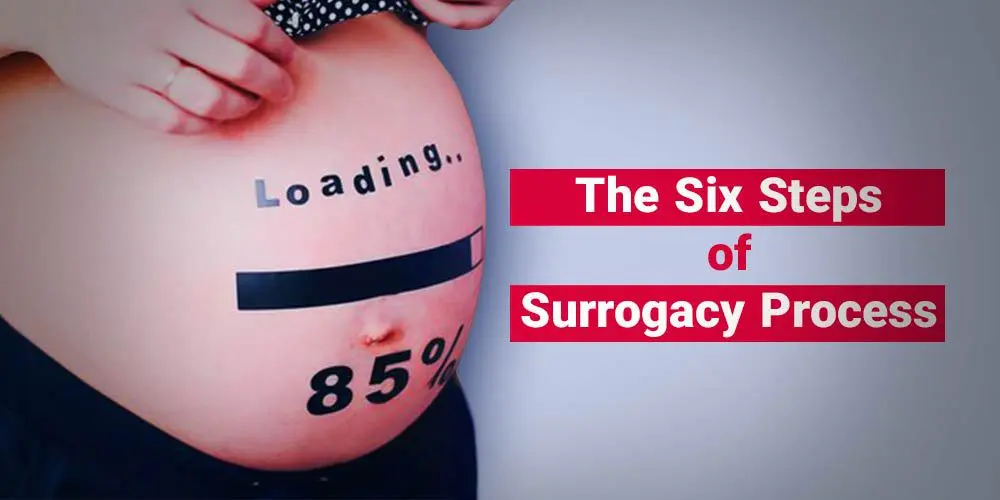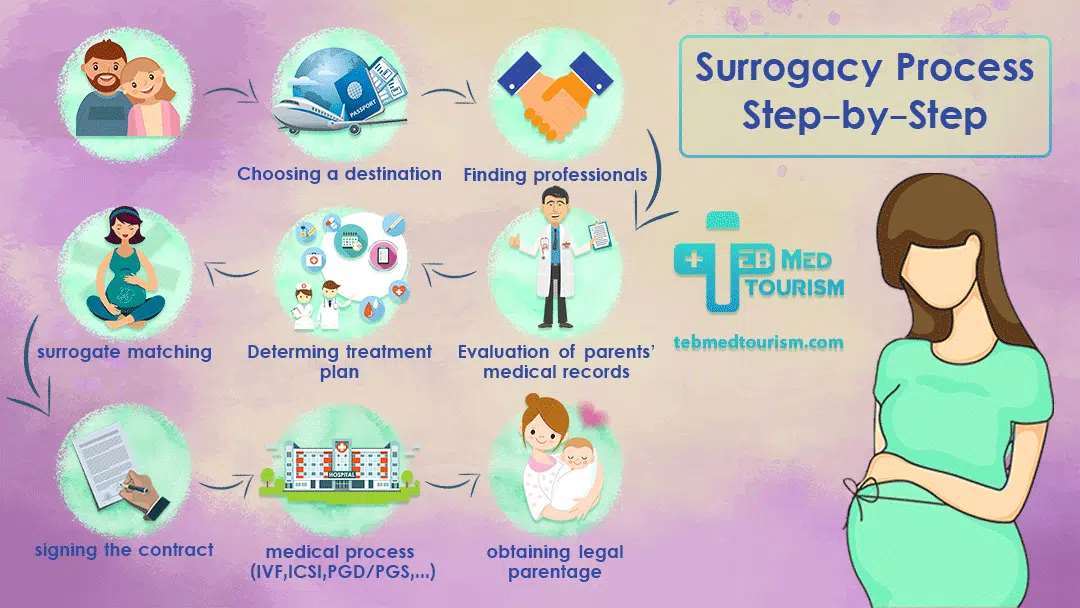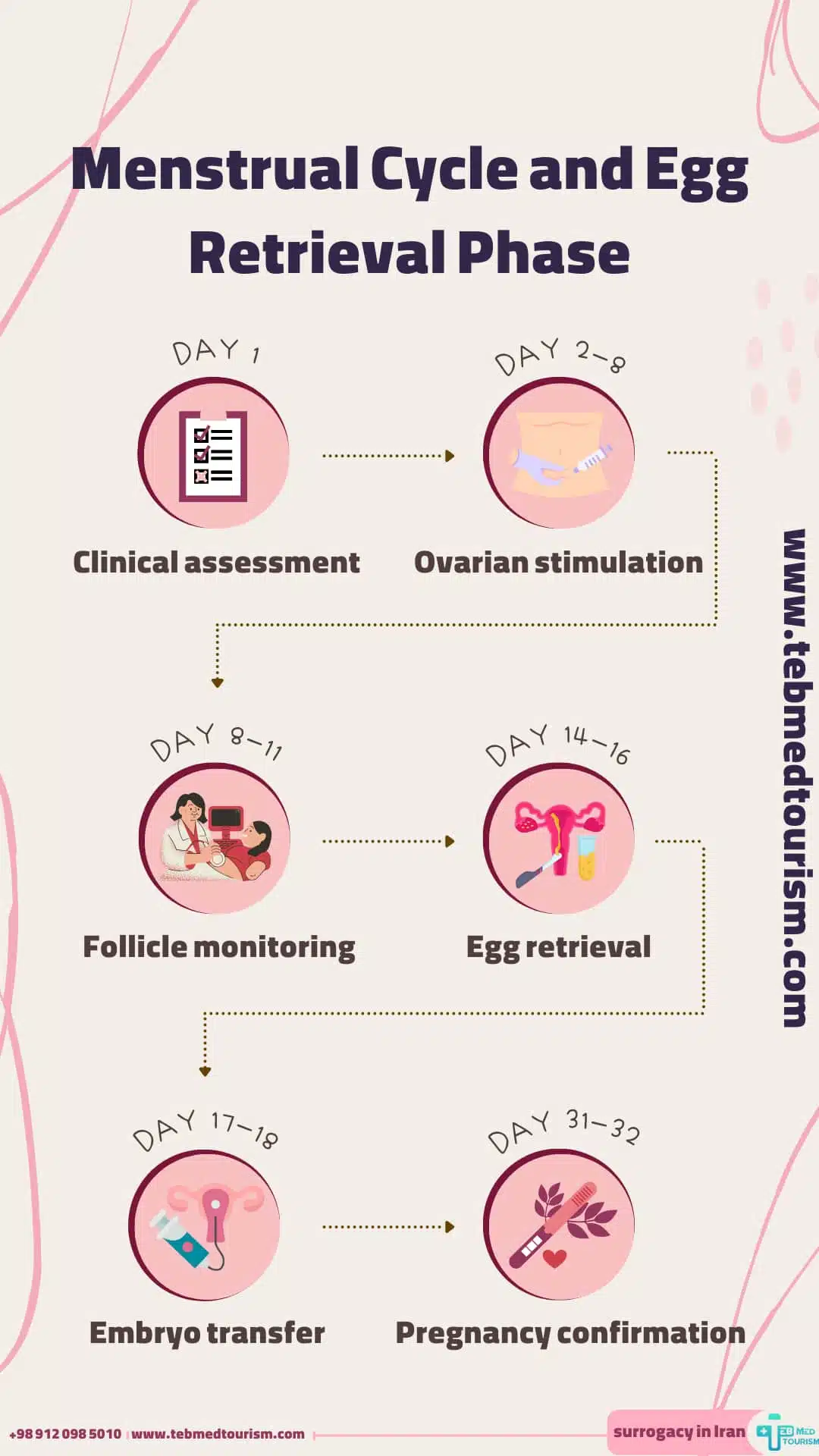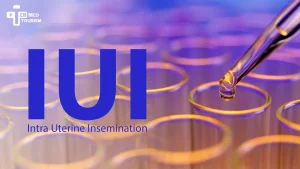The journey to parenthood is often filled with challenges, and for some, surrogacy becomes a practical and reliable solution. Whether you’re exploring surrogacy for the first time or are already familiar with it, understanding the surrogacy process step by step can make a significant difference in feeling confident and prepared.
This process involves legal, medical, and emotional aspects, each designed to ensure a smooth and successful journey for all parties involved. In this guide, we will break down each step clearly, offering insight into how surrogacy works and what to expect along the way.
What Exactly Is Surrogacy?

What are the Different Types of Surrogacy?
There are two main types of surrogacy: traditional surrogacy and gestational surrogacy. While both involve a surrogate carrying a child for intended parents, they differ significantly in terms of process, genetics, and legal considerations (1).
Traditional Surrogacy
Traditional surrogacy is the older and less common form of surrogacy. In this arrangement, the surrogate uses her own egg, making her the biological mother of the child.
Conception typically occurs through artificial insemination, where sperm from the intended father or a donor is used. Because the surrogate is genetically connected to the baby, this type of surrogacy can be emotionally and legally complex.
This method may be chosen when the intended mother cannot provide viable eggs or when a donor egg is not an option. However, due to the genetic link between the surrogate and the child, traditional surrogacy is less common today and is often avoided due to the potential for legal disputes and emotional challenges.
Gestational Surrogacy
Gestational surrogacy is the more widely practiced and preferred option today. In this process, the surrogate carries an embryo created through in vitro fertilization (IVF). The embryo is made using eggs and sperm from the intended parents or donors, meaning the surrogate has no genetic connection to the baby.
Gestational surrogacy is popular because it offers clear legal boundaries and eliminates the emotional complexity that can arise from the surrogate’s genetic link to the child. It is a common choice for couples facing infertility, same-sex couples, or individuals who want to have a biological connection to their child through their own genetic material.
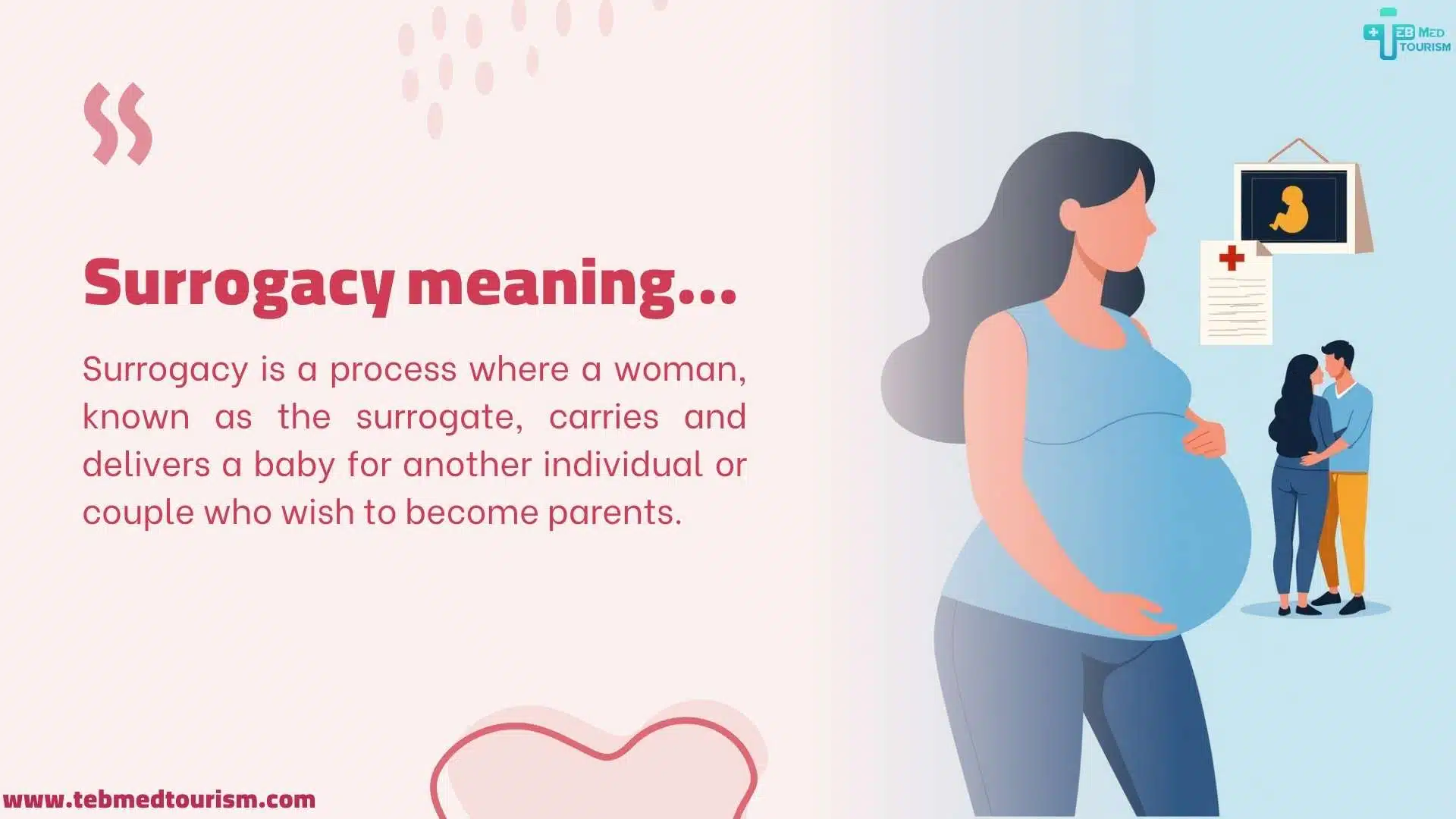
Surrogacy Process Step-By-Step in 2025
1. Pre-Operative Procedures
The pre-operative phase ensures that the intended parents, surrogate, and involved medical teams are prepared for a successful surrogacy journey. The key steps include:
Medical Records and History Evaluation:
- A thorough review of the intended parents’ medical history, previous treatments, and current health status to ensure suitability for surrogacy.
Surrogate Selection:
- Potential surrogates are carefully screened to assess physical, psychological, and mental health. Since gestational surrogacy does not involve the surrogate’s genetic material, these factors are prioritized over genetic considerations. Profiles of potential surrogates are shared with the intended parents for selection.
Legal Agreements and Documentation:
- A personalized contract is drafted for the intended parents to outline roles, rights, and responsibilities.
- A Power of Attorney (POA) allows TebMedTourism to act as the representative of the intended parents, ensuring smooth management during pregnancy or unforeseen circumstances.
- A legal contract with the surrogate defines her obligations, rights, and compensation. Approximately 50% of her fee is deferred until post-delivery to enhance commitment.
- Additional guarantees include securing a promissory note from the surrogate and holding her ID card until delivery.
Medical Tests for Surrogate and Egg Provider (Mother or Donor):
- These tests ensure reproductive health and readiness for the surrogacy process.
- General, viral, and hormonal laboratory tests.
- Comprehensive uterine and ovarian assessments via transvaginal ultrasound.
Medical Tests for the Intended Father:
- Focused on evaluating fertility and overall health:
- Viral screenings for infections like Hepatitis B, Hepatitis C, and HIV.
- Detailed semen analysis to assess sperm quality and viability.
2. Menstrual Cycle and Egg Retrieval Phase
The Menstrual Cycle and Egg Retrieval Phase is a meticulously organized 32-day journey, carefully designed to synchronize the menstrual cycle of the egg provider with the surrogacy timeline for optimal embryo preparation.
This ensures the ideal conditions for embryo development and successful implantation. To provide a clear understanding, we’ve outlined each step of this phase day by day, highlighting the key medical procedures and milestones. This structured and precise approach plays a vital role in maximizing the chances of a successful outcome.
Day 1:
- Clinical assessment by a fertility specialist.
- Transvaginal ultrasound for baseline ovarian evaluation.
- A customized treatment plan is prescribed, tailored to patient parameters such as age, weight, and height.
Day 2-8:
- Initiation of ovarian stimulation medication.
- Adjustments made during regular checkups to optimize follicular development.
Day 8-11:
- Follicle size is monitored via transvaginal ultrasound.
- Dosages are fine-tuned based on response to medication.
Day 14-16:
- Egg Retrieval: A minor surgical procedure performed under sedation to collect mature eggs.
- Sperm Collection: The intended father provides a fresh sample for fertilization.
- IVF/ICSI: Fertilization is carried out in a controlled laboratory environment, followed by embryo culturing.
Day 17-18:
- Embryo Transfer: Viable embryos are transferred to the surrogate’s uterus under ultrasound guidance.
- Medications are adjusted to support implantation.
Day 31-32:
- Pregnancy Confirmation: Blood tests (β-hCG) and ultrasounds confirm successful implantation.
3. Pregnancy Phase
Continuous monitoring ensures the health and safety of both the surrogate and the developing fetus.
Early Pregnancy Monitoring:
- Initial ultrasound (approximately one week after a positive pregnancy test) to confirm the presence of the gestational sac.
- Cardiac activity is assessed three weeks after the initial positive pregnancy test.
Routine Prenatal Care:
Comprehensive screenings, including first and second-trimester tests and cell-free fetal DNA analysis, are performed.
4. Delivery
The delivery marks the culmination of the surrogacy journey, requiring precise coordination.
Parent Arrival:
- Intended parents are required to be present in Iran prior to delivery to receive their newborn.
Handover Process:
- The surrogate delivers the baby to the intended parents.
- Final compensation is provided, and all guarantees (e.g., ID card, promissory note) are returned to the surrogate.
Post-Delivery Paternity/Maternity Test:
- DNA testing in an international genetics laboratory confirms the genetic parentage of the newborn
For detailed insights about surrogacy in Iran, we invite you to read our comprehensive article, Surrogacy in Iran, where you’ll find everything you need to know.
5. Exit Permission and Passport Acquisition
After delivery, obtaining legal documents for the newborn is critical. TebMedTourism facilitates this process with unmatched expertise in navigating Iran’s legal system.
Depending on the intended parents’ nationality, TebMedTourism ensures the issuance of the necessary passport or exit permit so the family can return to their home country promptly.
Conclusion
The surrogacy journey is a well-coordinated process that involves meticulous planning and execution at every stage. From pre-operative procedures like medical evaluations and legal agreements to the menstrual cycle synchronization and egg retrieval phase, each step is carefully designed to optimize the chances of a successful outcome.
The pregnancy phase ensures the health and well-being of the surrogate and the developing baby, culminating in the delivery and legal handover to the intended parents.
At TebMedTourism, we are committed to making the surrogacy process seamless, ethical, and efficient. With expert guidance and personalized care, we support intended parents through every phase, ensuring their dream of parenthood becomes a reality.
Whether it’s navigating legal requirements, ensuring medical precision, or managing exit permissions, TebMedTourism is your trusted partner in creating families through surrogacy.
How Is Surrogacy Process Done?
The surrogacy process begins with a thorough medical and psychological evaluation of the intended parents and the surrogate to ensure eligibility and health. Following legal contract finalization, ovarian stimulation is initiated for the intended mother (or egg donor) to retrieve eggs, which are fertilized with sperm through in vitro fertilization (IVF) to create embryos. The embryos undergo genetic screening, if necessary, and one or more are transferred into the surrogate’s uterus during a controlled cycle. The surrogate is then monitored through regular ultrasounds and blood tests during pregnancy, leading to delivery under a prearranged birth plan.
How Long Is the Surrogacy Process?
The surrogacy process typically spans 12 to 18 months, depending on individual circumstances. This timeline includes the initial stages of medical and psychological evaluations, legal agreements, and surrogate matching, followed by the medical procedures such as ovarian stimulation, egg retrieval, fertilization through IVF, and embryo transfer. Once pregnancy is achieved, the gestational period lasts approximately 9 months, during which regular prenatal monitoring ensures the health of both the surrogate and the fetus. The process concludes with the delivery and legal establishment of parentage, which may vary based on jurisdictional requirements.
What is the first step for surrogacy?
The first step in the surrogacy is consultation and comprehensive evaluation to see if this is the best option for you. If you decide to proceed with this process, you should find an experienced surrogacy agency to help you with medical and legal work. You should also consider the laws related to surrogacy in both the destination country and your own country.







